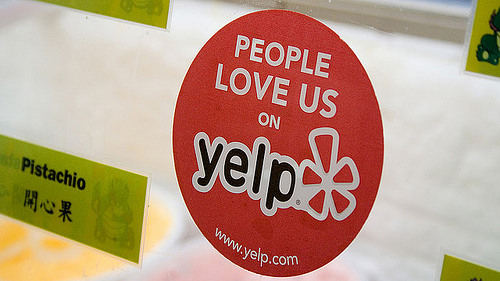How Yelp Affects Restaurant Reputations
Yelp is a polarizing third-party platform for many small business owners. The Internet has become the go-to medium for most consumer research. If you’re a business owner, it’s increasingly likely that a potential customer’s first introduction to your business will be in a list of Google search results, and your businesses’ Yelp page is bound to be at the top.
The impact of Yelp reviews on business
If you do any research into how Yelp reviews can affect a business, you’ll repeatedly come across research cited from a study that has become a sort of epochal text highlighting the start of an era when people really began to notice the impact of consumer-review sites on business. The text is from a 2011 research paper written by Harvard Business School associate professor, Michael Luca. The paper posits that during the course of it’s study of Yelp’s effects on Seattle area restaurants, the researcher found that, “a one-star increase in Yelp ratings results in a 5- to 9-percent increase in an independent restaurant’s revenue.”
That sort of influence on revenue is significant, especially for a small or new business. And it highlights the importance of consumer-review websites as third-party marketing platforms for small or independent businesses. It’s also important to note that this uptick in revenue for receiving an additional gilded star on Yelp was unique to ‘independent restaurants.’ The paper goes on to distinguish that ‘chain restaurants are unaffected by rating changes.’
What types of reviews will affect a business?
Most research on the effect of Yelp on businesses focuses on small businesses, and predominately on restaurants. The research also focuses specifically on the starred rating system that has become quite literally, marquee information for consumers, appearing on the Google search results page for all to see. You don’t even need to click the Yelp link to see if a business is 2 stars or 4 stars.
The way Yelp arrives at it’s rating has been the focus of a lot of businesses owner’s ire. The Washington Post claims that, “more than 700 businesses and consumers have filed complaints…with the Federal Trade Commission” That’s a lot of angry, fist-shaking business owners. Though Yelp has become more open about it’s algorithm and review-filter system, businesses still feel in the dark, or at the very least, in the shade, about exactly how their business receives it’s ratings. ReviewTrackers wrote about the review filter back in February. Yelp itself has stated that all reviews are not created equal. The review filter is a process that businesses don’t have control over, which understandably upsets owners, as the ratings are something that can really impact their likelihood to flourish or fail.
What can a business control about it’s Yelp rating?
You can apply reductionist logic to how a business is reviewed on Yelp. Good products and service will lead you to a honeypot of positive reviews. Bad products and services will create barbs of negative reviews. The quality of product is something that is ultimately a businesses’ responsibility and under its’ control. But what is the difference between good and great service? And what is the difference between 3-stars on Yelp, or 4?
The Atlantic ran an article that asked similar questions. The article cited research performed by a couple of Berkeley economic professors. The paper was published in the Economic Journal and what they found is striking:
‘Here’s how it works. When you look at a Yelp page for a restaurant, you will see the average of its reviews in a number of stars at the top — e.g. 3.0, 3.5, 4.0, 4.5, and 5.0. But of course those discrete rankings represent a much smoother distribution. In other words, when Yelp takes the average of its rankings, it gets numbers that are not 3.0 or 3.5, but that fall in between. Thus two restaurants can have very, very similar averages, say 3.24 and 3.26, but be rounded into different half-star categories, 3.0 and 3.5.’
Overall, they see effects of varying sizes for different reservation times and different ratings thresholds. The seven o’clock time slot sees the most significant effects: “Here,” they describe, “moving from 3 to 3.5 stars is associated with being 21 percentage points more likely to have sold out all 7:00 PM tables and moving from 3.5 to 4 stars makes”
This half-star rounding can lead to a significant impact on businesses. It’s also something that is out of the control of businesses.
How can a business utilize Yelp and online searches to its benefit?
Aggregate scores on Yelp will generally have a greater impact on consumer choice than any one individual review. That is because, as Michael Luca of the Harvard study notes, “consumers do not use all available information.” In fact, they use the most visible information, and the easiest to access, i.e., the starred-ratings.
It’s clear that small businesses need to be aware of their online reputation, and conscience of their profiles on websites like Yelp. But as an owner, you shouldn’t feel helpless against third-party websites like Yelp. Business owners and operators should take on a larger role in curating their online reputation. As consumers respond to the most visible information available, small business owners need to create larger, more visible online identities. You should also utilize the positive reviews and free marketing offered by sites like Yelp. Businesses should check out Yelp’s page for business owners and the guidelines on how to legally use Yelp’s brand to help support your own.
In a set of surprising results, the Boston Consulting Group found after a study, that large businesses still dominate the online and digital marketing landscape in terms of marketing dollars spent on focused, online campaigns. That’s in contrast, as the study notes, of half all sales in the United States since 1970, coming from small businesses. This is important to note, because if a business doesn’t utilize the online space as a tool for reaching new customers, then their online reputation will be dictated by the reviews of third-party websites like Yelp.
It’s necessary for a small business owner to take control of their online reputation, and to ensure that the message they want to spread is the one seen by the customer.
For more Uncorkd insights into how you can help your business, visit our resources page.
- 5 Fall Cocktails to Capture the Flavors of Autumn - September 26, 2018
- How Restaurants Can Ignore Sales and Increase Profits - May 9, 2018
- 2018 Spring Wine Trends - April 18, 2018









